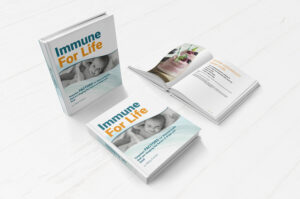Nutrition For Life – B12 Deficiency
B12 is crucial for neuro development and neuro health. It is also closely associated with SIBO due to its ability to mitigate the effects of H2S (hydrogen sulfide). B12 is also crucial for parasite, pathogen control and energy.
B12 is an essential vitamin. It’s found naturally in animal products, is an additive in certain foods and available as an oral supplement or injection.
Vitamin B12 supports the normal function of your nerve cells and is needed for red blood cell formation and DNA synthesis.
Benefits of B12:
Prevents anemia. Vitamin B12 plays a vital role in helping your body produce red blood cells low B12 prevents them from developing properly. Healthy red blood cells are small and round, whereas they become larger and typically oval in cases of vitamin B12 deficiency. Folic acid, also called folate, is another B vitamin. Anemias caused by a lack of vitamin B12 or a lack of folate are 2 types of megaloblastic anemia. Another type of B12 deficiency anemia is called pernicious anemia. This Vitamin B12 deficiency anemia is more common in people whose families come from northern Europe. It is caused by one of the following: Lack of intrinsic factor. Intrinsic factor is a protein made in the stomach. It is needed to absorb vitamin B12.
- Prevents birth defects
- Supports bone health
- Reduces macular degeneration
- Improves mood prevents depression
- Prevents neuron loss
- Increases energy
- Prevent heart disease
- Supports healthy hair, skin and nails
Who Is at Risk of Vitamin B12 Deficiency?
It is estimated that at least 6% of people aged 60 or older have vitamin B12 deficiency, while about 20% have low to normal or borderline deficient levels.
Older adults
People with gastrointestinal disorders, such as Crohn’s disease, celiac disease or SIBO.
Those who have had gastrointestinal surgeries, such as bariatric surgery or bowel resection surgery.
People on a strict vegan diet.
Those who take metformin for blood sugar control.
Those taking proton pump inhibitors for chronic heartburn.
In many older adults, the secretion of hydrochloric acid in the stomach is reduced, causing a reduction in the absorption of vitamin B12.
Extreme dieters. Even though some plant-based milks or grains may have been fortified with vitamin B12, vegan diets are often limited in this vitamin, putting people at risk of deficiency.
Who is at risk for vitamin B12 deficiency anemia?
Risk factors for vitamin B12 deficiency anemia include:
- A family history of the disease
Having part or all of your stomach or intestine removed. - Autoimmune diseases, including type 1 diabetes
- Crohn’s disease
- HIV
- Some medicines
Symptoms:
- Weak muscles
- Numb or tingling feeling in hands and feet
- Trouble walking
- Nausea
- Decreased appetite
- Weight loss
- Irritability
- Lack of energy or tiring easily (fatigue)
- Diarrhea
- Smooth and tender tongue
- Fast heart rate
The symptoms of megaloblastic anemia may look like other blood conditions or health problems.
Vitamin B12 is an indispensable micronutrient required for neurological integrity, hematopoiesis, and cellular metabolism. Because endogenous synthesis does not occur in humans, adequate intake through dietary sources or supplementation is essential. Deficiency, if unrecognized or untreated, may progress to irreversible neurological impairment, megaloblastic anemia, and increased morbidity. Populations with gastrointestinal disorders, restrictive diets, or advanced age are particularly vulnerable and warrant proactive monitoring. Ensuring sufficient B12 status through prevention, early detection, and appropriate therapeutic intervention is therefore critical for maintaining long-term health and physiological stability.
Source:
- Green R, Allen LH, Bjørke-Monsen AL, et al. Vitamin B₁₂ deficiency. Nat Rev Dis Primers. 2017;3:17054. PMID: 28660890.
- Kozyraki R, Cases O. Vitamin B₁₂ absorption: mammalian physiology and acquired and inherited disorders. Biochimie. 2013;95(5):1002–1007. PMID: 23178706.
Vitamin B12 absorption: mammalian physiology and acquired and inherited disorders
- David O. Kennedy
B Vitamins and the Brain: Mechanisms, Dose and Efficacy—A Review
Increase B Vitamins Naturally
LAB and bifidobacteria provide an effective way to increase vitamin levels in milk. Some bacterial strains in the genera Lactobacillus and Bifidobacterium provide an additional source of B vitamins (thiamine, riboflavin, cobalamin, folate, and biotin) during dairy fermentation.
Folate (vitamin B9) deficiency is linked to neural tube defects, some cancers, poor cognitive performance and heart disease. Instead of synthetic folate, foods can be naturally fortified with folate synthesized by LAB and bifidobacteria. Streptococcus thermophilus and L. bulgaricus are suitable for yogurt naturally enriched in this vitamin. High folate concentration can be reached in yogurt as a result of the ability of S. thermophilus to produce this vitamin.
Vitamin B12 deficiency is common, particularly in vegetarians. Animals, plants and fungi cannot produce B12, it is exclusively produced by microorganisms.
Cobalamin can be synthesized by bacteria such as L. reuteri, Propionibacterium freudenreichii and B. animalis Bb12.
How is B12 made?
Vitamin B12 (cobalamin) is a complex molecule produced exclusively by certain bacteria and archaea through two major biosynthetic pathways: the aerobic (oxygen-dependent) and anaerobic (oxygen-independent) routes.
General Biosynthesis Pathway
Both the aerobic and anaerobic pathways involve over 30 enzymatic steps and share some common initial and final stages. The entire process can be divided into three main stages:
Uroporphyrinogen III (UroIII) formation: The initial steps involve converting the precursor 5-aminolaevulinic acid (ALA) into uroporphyrinogen III, a key intermediate in the synthesis of all tetrapyrrole compounds (like heme and chlorophyll).
Corrin ring formation and cobalt insertion: This is the stage where the pathways diverge. A corrin ring structure is formed, and a cobalt ion is inserted into the center.
Nucleotide loop assembly: The final stage, common to both pathways, involves synthesizing the lower ligand (usually 5,6-dimethylbenzimidazole, DMB) and attaching it to the corrin ring to yield the final coenzyme forms, primarily adenosylcobalamin (AdoCbl).
more info:
SIBO
Serum levels of folate and vitamin B12 may be used to support evidence of bacterial overgrowth in pediatric settings. This ratio was one of the first testing methods used to diagnose SIBO.
Due to the difficulty in diagnosing SIBO, emerging molecular techniques in bacterial ‘fingerprinting’ may offer a more reliable way to define microbial populations in intestinal samples.
SIBO can cause severe malabsorption, serious malnutrition and deficiency syndromes.
more info:
H2S
- Fujita Y, et al. “Hydroxocobalamin therapy for acute hydrogen sulfide poisoning.” J Anal Toxicol. 2011;35(2):119–123. PMID: 21396232.
Human case report with pre- and post-treatment sulfide/thiosulfate levels; supports H₂S binding by hydroxocobalamin.
- Baud F, et al. “High-dose hydroxocobalamin administered after H₂S exposure counteracts sulfide-poisoning–induced cardiac depression in sheep.” Clin Toxicol (Phila). 2015;53(7):525–536. PMID: 25546714.
Large-animal model showing early 5 g IV hydroxocobalamin improved cardiac function and prevented pulseless electrical activity.
interesting note:
Fenbendazole
Benzimidazole was discovered during research on vitamin B12. The benzimidazole nucleus was found to be a stable platform on which drugs could be developed. Fenbendazole was developed as a veterinary anthelmintic (dewormer) in the early 1970s as part of a larger research effort to create safer and more effective benzimidazole drugs. Prior classes of benzimidazole drugs were extremely toxic.
Molecular formula:
Do not give fenbendazole to cats. It can produce anemia and possibly other blood disorders. Some species can not tolerate fenbendazole at all.
Animal-Based Sources (Richest Natural Sources)(daily value)
Clams – ~99 µg → 4125% DV
Liver (beef) – ~70–80 µg → 2915–3330% DV
Liver (chicken) – ~16 µg → 665% DV
Sardines (canned in oil) – ~8–9 µg → 335–375% DV
Mackerel – ~7–8 µg → 290–335% DV
Tuna – ~10 µg → 415% DV
Trout (rainbow) – ~5 µg → 210% DV
Salmon (cooked) – ~4 µg → 165% DV
Beef (lean cuts, cooked) – ~2–3 µg → 85–125% DV
Chicken breast (cooked) – ~0.3–0.5 µg → 12–20% DV
Eggs – ~1.1 µg → 46% DV
Milk (cow’s) – ~0.5 µg per cup → 21% DV
Yogurt (plain, low-fat) – ~0.5–1 µg per cup → 21–42% DV
Cheese (Swiss, cheddar) – ~0.9–1.5 µg per slice → 38–63% DV

Immune For Life
Forgotten factors for life and health that are shaping the future of drugs and food.
Journey to a healthier lifestyle

Immune For Life
M. Ferrari
After decades of chronic health conditions and serious gut issues like IBS and SIBO, immune deficiencies and an autoimmune condition discover how I recovered my health thanks to natural oral immune therapeutics (maf and gcmaf). Due to a premature birth and being formula fed, I was a SAM child in real life. My book is a step by step journey you won't want to miss that illustrates how to regain or maintain health for all ages.